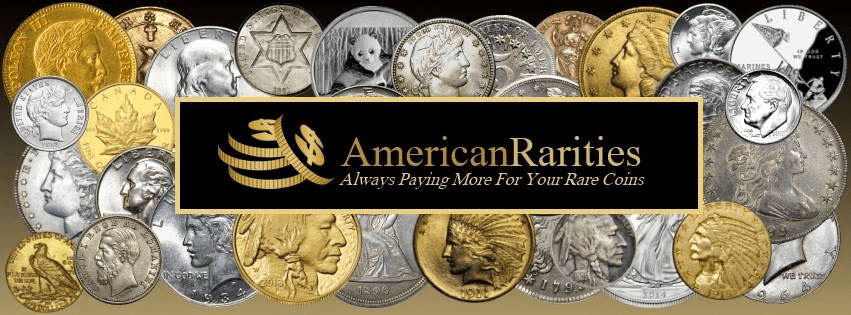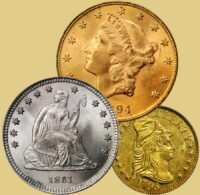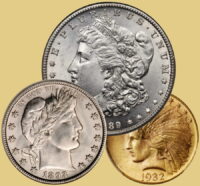Information regarding State and Federal
Coin Laws and Tax Reporting Obligations
South Dakota - Wyoming

Sales Tax Laws:
Statute 10-45-110 of the South Dakota Codified Laws, there is an “exemption for sales of coins, currency, or bullion.”
Bullion is defined as “any bar, ingot, or commemorative medallion of gold, silver, platinum, palladium, or a combination of these metals where the value of the metal depends on its content and not the form.”
Coins and currency is defined as “any coins or currency made of gold, silver, or other metal or paper which is or has been used as legal tender.”
Capital Gains Tax:
South Dakota does not impose a state income tax on its citizens, so there is no taxation on capital gains on precious metals.
Sales Tax Law:
Tennessee law currently levies a sales tax on precious metals purchases..
Capital Gains Tax:
Gold and silver are subject to capital gains taxation when exchanged for Federal Reserve notes or when used in barter transactions.
Sales Tax Law:
Texas does not charge sales tax on precious metals purchases of any amount.
Capital Gains Tax:
Texas does not impose a state income tax on its citizens, so there is no taxation on capital gains on precious metals.
Sales Tax Laws:
Utah law has a product-based exemption for sales and use tax. This exemption covers “sales of an ingot, bar, medallion or decorative coin containing at least 50 percent gold, silver or platinum that is not legal tender of any nation.”
Capital Gains Tax:
Gold and silver are not subject to capital gains taxation when exchanged for Federal Reserve notes or when used in barter transactions in the state of Utah. The passage of HB 317 in 2011 includes “a nonrefundable credit established for any capital gains incurred from the exchange of gold and silver coin issued by the federal government for another form of legal tender.”
Sales Tax Laws:
Precious metals purchases are subject to a 6% sales tax in the state of Vermont.
Capital Gains Tax:
Gold and silver are subject to capital gains taxation when exchanged for Federal Reserve notes or when used in barter transactions.
Sales Tax Laws:
February 2017, the Governor of Virginia signed a bill into law that creates a sales tax exemption on precious metals purchases. House Bill 1668 reads “the tax imposed shall not apply to the following…effective through June 30, 2022, gold, silver or platinum bullion or legal tender coins whose sales price exceeds $1,000. Each piece of gold, silver, or platinum or legal tender coin need not exceed $1,000, provided that the sales price of one entire transaction of such pieces exceeds $1,000.”
“Gold, silver, or platinum bullion” is defined as gold, silver, or platinum, and any combination thereof, that has gone through a refining process and is in a state or condition such that its value depends on its mass and purity and not on its form, numismatic value, or other value.”
“Legal tender coins” is defined as “coins of any metal content issued by a government as a medium of exchange of payment of debts.”
Neither “gold, silver, or platinum bullion” and “legal tender coins” include jewelry or works of art.
Capital Gains Tax:
Gold and silver are subject to capital gains taxation when exchanged for Federal Reserve notes or when used in barter transactions.
Sales Tax Laws:
Effective July 1985, the Washington Administrative Code 458-20-248 states that “amounts derived from sales of precious metal bullion and monetized bullion as defined herein, are not subject to business and occupation tax under either the wholesaling or retailing classification or to retail sales tax.”
“Precious metal bullion” is defined as “any precious metal which has been put through a process of smelting or refining, including, but not limited to, gold, silver, platinum, rhodium, and palladium, and which is in such state or condition that its value depends upon its contents and not upon its form.”
“Monetized bullion” is defined as “coin or other forms of money manufactured from gold, silver, or other metals and heretofore, now, or hereafter used as a medium of exchange under the laws of this state, the United States, or any foreign nation, but does not include coins or money sold to be manufactured into jewelry or works of art.”
Capital Gains Tax:
Washington does not impose a state income tax on its citizens, so there is no taxation on capital gains on precious metals.
Sales Tax Laws:
March 2019, Governor Jim Justice signed Senate Bill 502 into law. SB 502 exempts investment metal bullion or investment coins from consumer sales and service tax.
“Investment metal bullion” is defined as any elementary precious metal which has been put through a process of smelting or refining, including gold, silver, platinum, and palladium, and which is in such a state that its value depends upon its content and not its form. This definition does not include precious metal which has been assembled, fabricated, manufactured, or processed in one or more industrial, professional, aesthetic, or artistic uses.
“Investment coins” is defined as numismatic coins or other forms of money and legal tender manufactured of gold, silver, platinum, and palladium, or other metal and of the United States or any foreign nation with a fair market value greater than any nominal value of such coins. This definition does not include jewelry or works of art made of coins, nor does it include commemorative medallions.
Capital Gains Tax:
Gold and silver are subject to capital gains taxation when exchanged for Federal Reserve notes or when used in barter transactions.
Sales Tax Laws:
Tax Statute 11.78, “silver bullion and gold bullion” fall under the umbrella of types of tangible property and items subject to sales taxation.
Capital Gains Tax:
Gold and silver are subject to capital gains taxation when exchanged for Federal Reserve notes or when used in barter transactions.
Sales Tax Laws:
2018, Wyoming passed House Bill 103, the Wyoming Legal Tender Act. House Bill 103 says that “no specie or specie legal tender shall be characterized as personal property for the purposes of property taxation,” “the exchange of one type or form of legal tender for another type or form of legal tender shall not give rise to any tax liability of any kind,” and, “the purchase, sale, or exchange of any type or form of specie or specie legal tender shall not give rise to any tax liability of any kind.”
House Bill 103 defines specie as “coin having gold or silver content; or refined gold or silver bullion which is coined, stamped or imprinted with its weight and purity and valued primarily based on its metal content and not its form.”
House Bill 103 defines specie legal tender as “specie coin issued by the United States government at any time; specie coin issued by any foreign government at any time; any other specie that a federal court of competent jurisdiction, by final and unappealable order, rules to be within state authority to make or designate as legal tender. No court of the state of Wyoming shall be deemed to be a court of competent jurisdiction for purposes of this paragraph.”
Capital Gains Tax:
Wyoming does not impose a state income tax on its citizens, so there is no taxation on capital gains on precious metals.
Free Appraisal for Your Coins and Coin Collections
Email, Text, or Use This Form To Send Us Your Inventory List or Pictures
Email: staff@americanrarities.com | Phone: 800-622-5680 | Text: 720-600-4740



